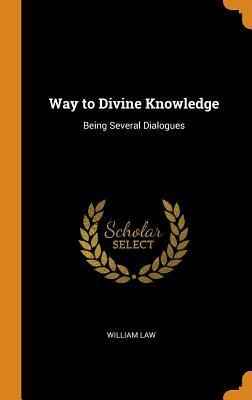- Bible
- Read the Bible
- Bible Versions
- Verse of the Day
- Reading Plans
- Verses by Topic
- Books of the Bible
- Bible Images
- Study
- Commentaries
- Concordances
- Dictionaries
- Encyclopedias
- Sermons
- Bible Atlas & Maps
- BP Wiki
- Devotionals
- Today's Devotionals
- Light of the World
- All Devotionals
- Inspirational Quotes
- More
- Picture Quotes
- Videos
- Inspirational
- Bible Study
- What The Bible Says
- Bible Q&As
- Daily Bread
- Bible by Genre
- Bible Stories
- Random Bible Verse
- Community
- Store
Way to Divine Knowledge: Being Several Dialogues
by William Law
This work has been selected by scholars as being culturally important and is part of the knowledge base of civilization as we know it.
This work is in the public domain in the United States of America, and possibly other nations. Within the United States, you may freely copy and distribute this work, as no entity (individual or corporate) has a copyright on the body of the work.
Scholars believe, and we concur, that this work is important enough to be preserved, reproduced, and made generally available to the public. To ensure a quality reading experience, this work has been proofread and republished using a format that seamlessly blends the original graphical elements with text in an easy-to-read typeface.
We appreciate your support of the preservation process, and thank you for being an important part of keeping this knowledge alive and relevant.
This work is in the public domain in the United States of America, and possibly other nations. Within the United States, you may freely copy and distribute this work, as no entity (individual or corporate) has a copyright on the body of the work.
Scholars believe, and we concur, that this work is important enough to be preserved, reproduced, and made generally available to the public. To ensure a quality reading experience, this work has been proofread and republished using a format that seamlessly blends the original graphical elements with text in an easy-to-read typeface.
We appreciate your support of the preservation process, and thank you for being an important part of keeping this knowledge alive and relevant.
Hardcover, 102 pages
Published October 7th 2018 by Franklin Classics
© 2025 Bibleportal.com All rights reserved.

William Law was an English cleric and theological writer. He was educated at Emmanuel College, Cambridge, and was elected a fellow in 1711, the year of his ordination. He declined to take the oath of loyalty to King George I, in 1714, and was deprived of his fellowship. He became the tutor of Edward Gibbon, father of the famous historian. Later he returned to his birthplace of King's Cliffe where he lived the rest of his life, though he was known throughout England for his speaking and writing.
His writing of A Serious Call to a Devout and Holy Life (1728), together with its predecessor, A Practical Treatise Upon Christian Perfection (1726), deeply influenced the chief actors in the great Evangelical revival.
John and Charles Wesley, George Whitefield, Henry Venn, Thomas Scott, and Thomas Adam all express their deep obligation to the author. The Serious Call also affected others deeply.
William Law, born inKing's Cliffe, England, in 1686, became a Fellow of Emmanuel College, Cambridge in 1711, but in 1714, at the death of Queen Anne, he became a non-Juror: that is to say, he found himself unable to take the required oath of allegiance to the Hanoverian dynasty (who had replaced the Stuart dynasty) as the lawful rulers of the United Kingdom, and was accordingly ineligible to serve as a university teacher or parish minister.
He became for ten years a private tutor in the family of the historian, Edward Gibbon (who, despite his generally cynical attitude toward all things Christian, invariably wrote of Law with respect and admiration), and then retired to his native King's Cliffe. Forbidden the use of the pulpit and the lecture-hall, he preached through his books. These include - Christian Perfection, the Grounds and Reasons of Christian Regeneration, Spirit of Prayer, the Way to Divine Knowledge, Spirit of Love, and, best-known of all, A Serious Call To a Devout and Holy Life, published in 1728.
Law's most influential work is A Serious Call to a Devout and Holy Life, written in 1728. In this book, he extols the virtue of living a life totally devoted to the glory of God. Although he is considered a high-churchman, his writing influenced many evangelicals, including George Whitefield, John and Charles Wesley, Henry Venn, Thomas Scott, Henry Martyn, and others such as Samuel Johnson. In addition to his writing, Law spent the final years of his life founding schools and almshouses, and in other practical ministries.
William Law died in 1761 just a few days after his last book, An Affectionate Address to the Clergy, went to the printers.
... Show more